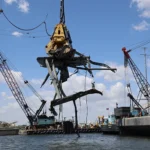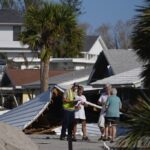The Hartford Financial Services Group CEO Liam McGee said his company’s gross losses from Superstorm Sandy may hit the reinsurance deductible of $350 million.
Speaking at the Goldman Sachs Financial Services Conference in New York on Wednesday, McGee also remarked that the industry will have to come to terms with the fact that “undoubtedly weather has changed.”
McGee said The Hartford expects to provide a loss estimate soon, but added that the process is taking longer than usual because of the volume and nature of business interruption claims.

“As I stated in our November earnings call, losses from Superstorm Sandy will be manageable for The Hartford,” he said at the conference. “At this time, recognizing that our work is not complete, it is possible that gross losses will hit our reinsurance deductible of $350 million.”
“Under our reinsurance program we retain only 10 percent of losses above $350 million. We will update you as soon as we finalize the loss estimate, based on projected claims and average costs.”
In terms of what the company expects to be the ultimate dollars of claims, it will be about 60 percent commercial and 40 percent personal lines, McGee said. “And interestingly, in the commercial lines we would expect about half of that to be business interruption.”
The Hartford’s Chief Financial Officer Chris Swift added that “the business interruption is an endorsement. We write most of our business interruption on small commercial, but
it’s tailored. There are sublimits, and it follows the peril, the main loss event, to trigger the BI claim.”
“So that’s why it’s been taking a lot of time to work through the power companies and really determine what is the causation of the business interruption, flood versus no flood versus power lines down and things along those lines. But there are sublimits on the business interruption.”
A Continued Focus on Getting Rate
CEO McGee said that industry-wide, Sandy losses are clearly going to cause a continued focus on getting rate, “which we were focused on and I think other industry leaders have been focused on. I think this increases the urgency on that.”
He added that, “without a doubt for us and for the industry, it’s going to cause us to re-look at risk management and models, particularly in property.”
The Hartford as well as the industry as a whole will have to come to terms with the fact that “undoubtedly weather has changed,” he said. The Hartford increased CAT loads from 2011 to 2012, and “while our numbers aren’t final for 2013, I think it is likely we will do the same in 2013.”
“Whether it’s global warming, climate change, I think as an industry we have to assume this is a new normal and we’ll run our business consistent with that,” McGee said.
“If we are seeing some type of climate change as manifested in higher CATs, I think it means that us and the industry are going to be even more disciplined in getting paid for the risks we take. I think some are going to learn some painful lessons through this cycle and perhaps have to look at their risk models differently.”
Was this article valuable?
Here are more articles you may enjoy.


 Homeowners Insurance Does Not Cover Cryptocurrency Theft, 4th Circuit Affirms
Homeowners Insurance Does Not Cover Cryptocurrency Theft, 4th Circuit Affirms  US Gains $100M Settlement With Owner, Operator of Ship That Wrecked Key Bridge
US Gains $100M Settlement With Owner, Operator of Ship That Wrecked Key Bridge  Universal, AmCoastal Report Some Costs from Helene, Milton for Q3
Universal, AmCoastal Report Some Costs from Helene, Milton for Q3  Florida’s Heritage Insurance Reports 5,400 Claims, $57M in Cat Losses From Milton
Florida’s Heritage Insurance Reports 5,400 Claims, $57M in Cat Losses From Milton 

